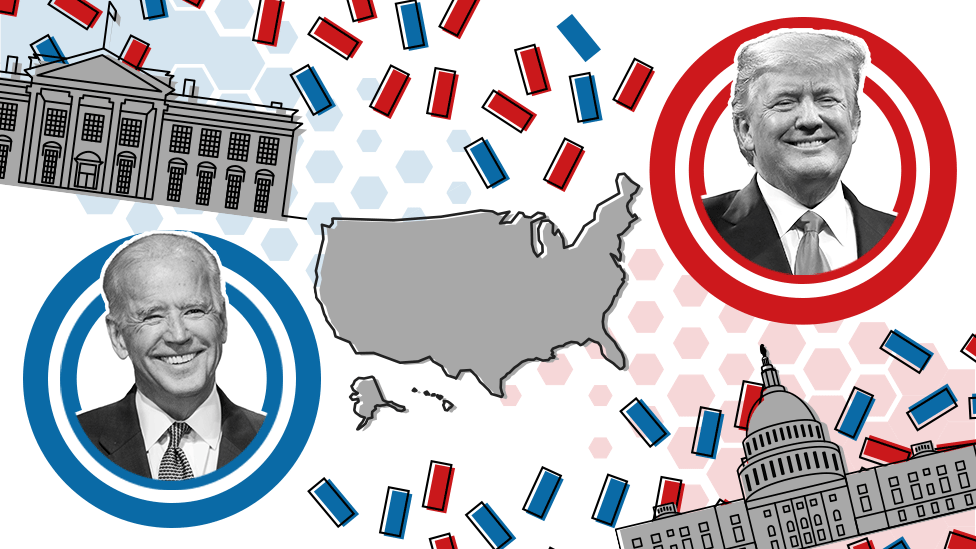US election 2020: How the ghost of 'socialism' is dividing Venezuelan vote
- Published
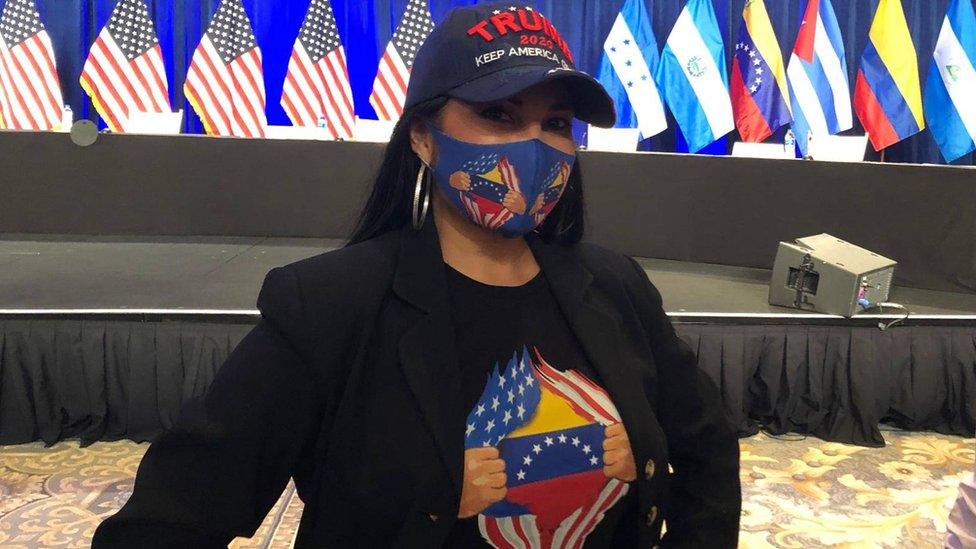
Venezuelan actress Lilibeth Morillo sees Trump as a barrier to the spread of communism
Venezuelan-born actress Lilibeth Morillo wears a "Keep America Great" hat and a face-mask bearing the Venezuelan and US flags.
She brought both items to a recent "Latinos for Trump" rally in the suburb of Doral, the hub of Miami's Venezuelan community referred to by locals as "Doralzuela".
"Do you know why I support Trump? Because he is literally the wall of contention between communism and the world," she wrote on Instagram shortly after the event.
Morillo is one of many Venezuelan-Americans who is hoping Donald Trump will be re-elected to the White House.
The US presidential race has become a controversial topic in this community, which finds itself divided. A number of Venezuelans in Doral who support Trump fear that his rival, Joe Biden, will take the US towards "socialism". They claim his "Build Back Better" economic plan would create a crisis similar to the one that forced many of them to flee their homeland for Florida.
But others are rooting instead for Biden because they say they see an authoritarian and anti-democratic streak in the US president that reminds them of the late Venezuelan leader Hugo Chavez and, his successor, current Venezuelan President Nicolas Maduro.
The severe crisis experienced by Venezuela led to an exponential increase in the number of migrants from that country arriving in the US, and particularly in Florida, during the last decade.
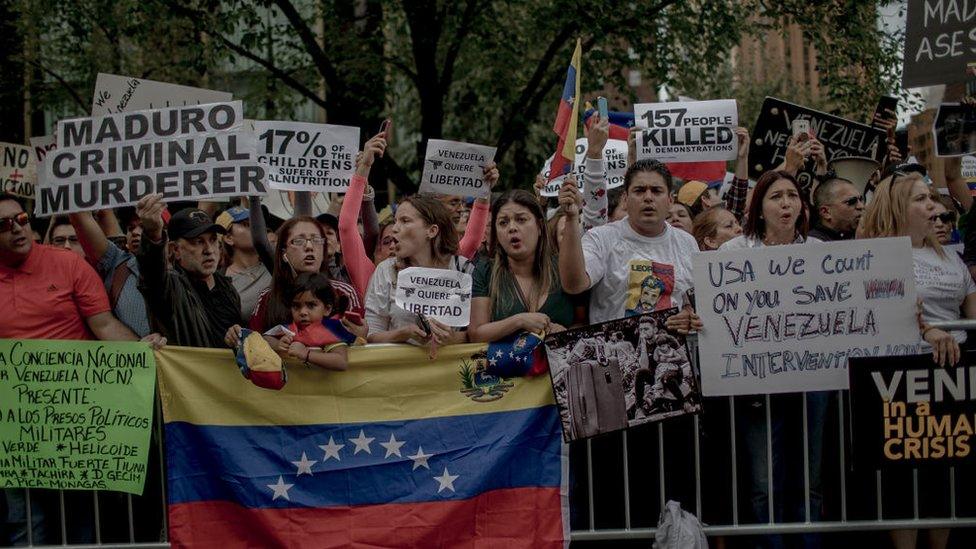
Some Venezuelans in the US want the White House to take stronger action to improve the situation at home
Trump and Biden have tried to attract those potential voters with strong criticism of the Maduro administration. Both candidates refer to the Venezuelan leader as a "dictator".
From the White House, Trump has been a strong supporter of Venezuelan opposition leader Juan Guaido, recognised by his administration as the "interim president" of Venezuela.
That is a stance that appears to be playing well in the Sunshine State - where two out of every three Venezuelans support Trump, according to a University of North Florida poll published in early September by the Miami Herald.
Venezuelans are thought to be among the Latino immigrant communities growing fastest in the United States.
In 2018 that there were 492,000 persons of Venezuelan ancestry in the country, a 529% increase compared to the 93,000 who lived here in 2000, according to the Pew Research Center.
Within this group, there are around 169,000 Venezuelan-Americans with the right to vote in the US, Mark Hugo Lopez, head of demographic research and global migration at Pew, told the BBC.
Fernand Amandi, a Miami pollster and expert on the US Hispanic vote, says Venezuelan-Americans could have a decisive impact in Florida, where some 50,000 US citizens of Venezuelan origin are registered to vote.


Amandi recalls the 2000 presidential election, in which George W Bush's victory in the state by 537 votes was enough to deliver him the White House.
With that in mind, "any sub-group of voters could be determinant" in Florida, he tells the BBC.
Carolina Tejera is another Trump supporter. She has lived for 20 years in Miami and is a member of the Venezuelan-American Republican Alliance.
"I am living a déjà vu. After witnessing the destruction of Venezuela I am seeing this in the US," she says.
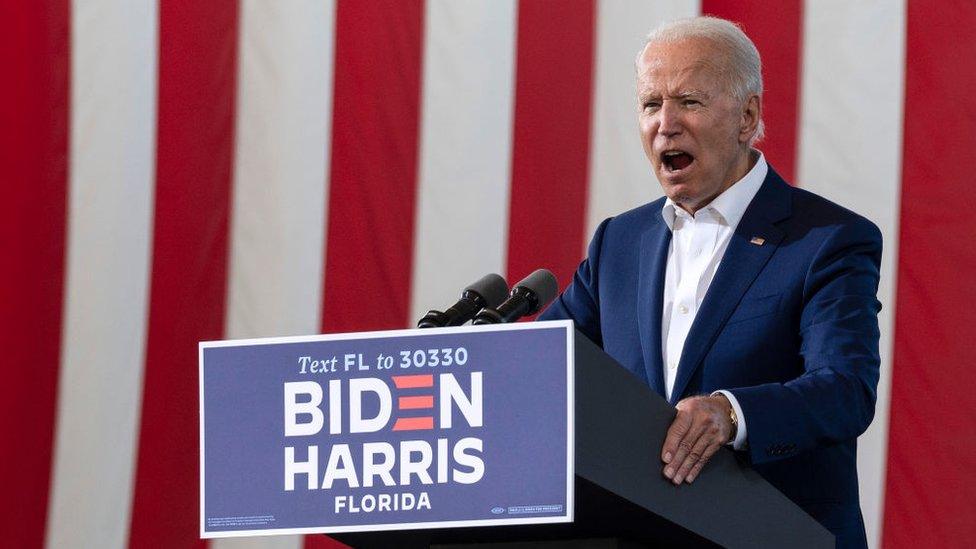
Some Venezuelans believe Joe Biden is too left-wing
Tejera is worried about the discourse against the police as well as the Democratic Party's position on abortion and the promise of free college tuition. "There is no free education. It is a lie. No system can withstand that," she claims.
"Socialism is the anaesthesia for the introduction of Communism," Tejera argues. "All of Biden's discourse is entirely communist. It is the far left. It is the same I listened to from Chavez. Biden is a Trojan horse. He will ally himself with Maduro".
US election: Why Trump and Biden's Spanish ads matter
Tejera describes Trump as a "patriot" and believes that in a second term, the president could help Venezuela more, although not through a military invasion.
Other Miami Venezuelans oppose Trump. Some see in him elements of the authoritarianism they abhorred in Hugo Chavez.
Michel Hausmann, head of the Miami New Drama company and the Colony Theatre, is one of them.
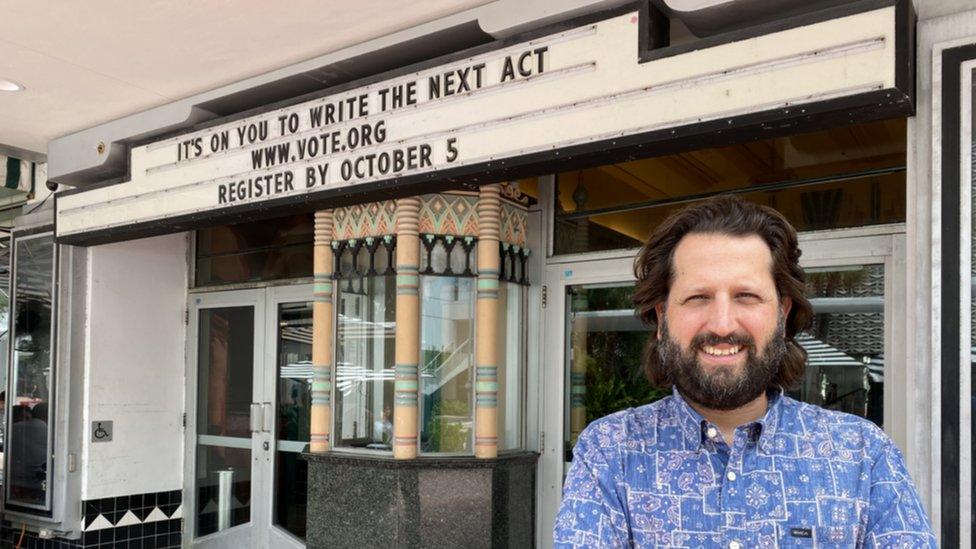
Michel Hausmann uses his Miami theatre signage to encourage people to vote
Back in Venezuela, Haussmann ran into trouble with the government. A decade ago, when he still lived in Caracas, Chavez supporters threw tear gas at spectators attending one of his plays.
"Basically, the government forced me to close down my theatre company and leave the country," he tells the BBC.
But Haussman does not blame socialism for this. Rather, he points out to the authoritarian drift of the Chavez government in Venezuela.
He has written on blogs, inviting Venezuelan-Americans to vote against Trump.
He says he understands why some of his fellow countrymen support the US president, even if he does not share his position.
"I do not blame my compatriots. They are a people who have lost everything. People whose life was destroyed, they had to leave their family behind, close down their businesses. Being in exile is not easy," he adds.
- Published7 November 2020
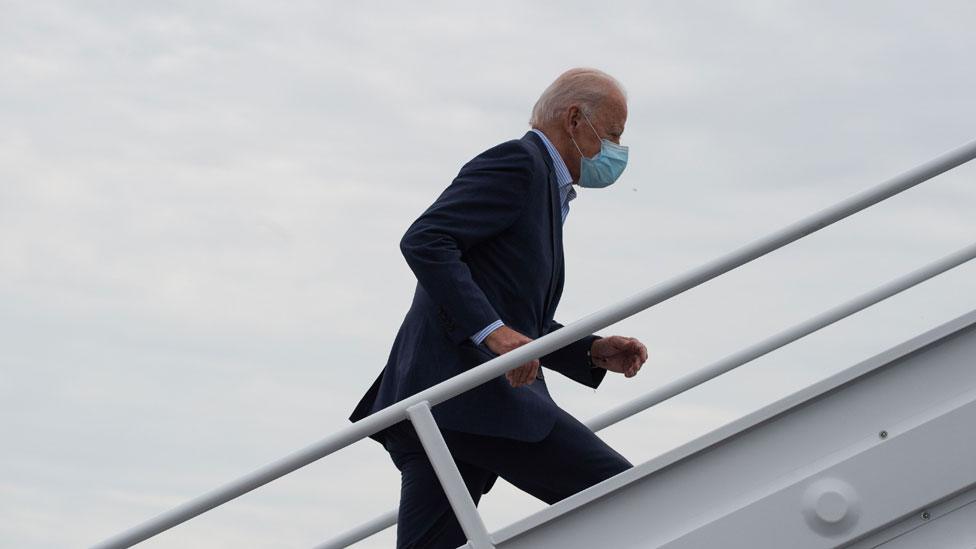
- Published28 October 2020
